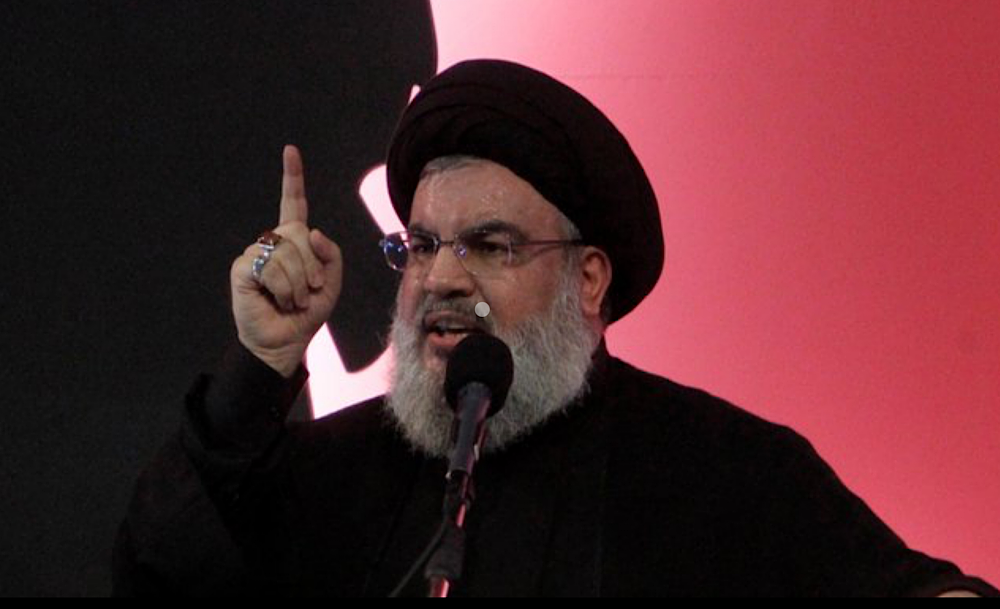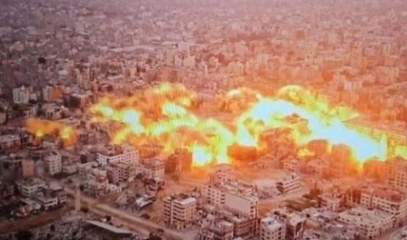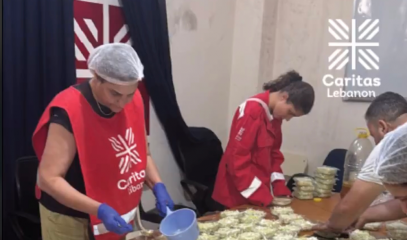Israel says Nasrallah ‘eliminated’, Caritas Lebanon laments heavy bombing, critical situation
Israel’s military announced the death of Hezbollah’s leader and its number three. Speaking to AsiaNews, Fr Michel Abboud paints a “very difficult" picture, saying that a Carmelite convent was just missed by an Israeli airstrike. People are fleeing "with no prospect of safety" and the displaced emergency is increasing. In an appeal "for help and support", the clergyman said that “needs are huge”.
Beirut (AsiaNews) - "The situation at present in Lebanon is very difficult, if not critical, and it is not possible to make assumptions about what may happen in the future, but we know that the prospects are bleak,” said Fr Michel Abboud, president of Caritas Lebanon, speaking to AsiaNews.
Israeli military sources are behind reports that Hezbollah leader Hassan Nasrallah was killed in yesterday’s heavy bombing.
“Heavy bombing continues in Beirut and loud explosions are heard amid a very complicated picture,” said the priest. Low-flying Israeli jet fighters dropped bombs that hit a wide area but just missed “Our convent of the Carmelite fathers”.
In Israel “They say they targeted the leaders of Hezbollah, that they targeted their shelters," the Caritas president notes.
"Since yesterday, people have been receiving [anonymous] calls and messages on their phones, ordering them to leave their homes, because the surrounding area was going to be bombed.”
As a result, “People have poured into the streets not knowing where to go, without a shelter to hide in, with no prospects of safety" in a war that, once again, from Gaza in the south to Lebanon in the north, is sweeping away and killing civilians.
In the morning, rumours of Nasrallah’s death spread quickly. A statement by Israel’s military announced that he had been “eliminated” along with his number three, Ali Karki, commander Hezbollah's Southern Front.
"Hassan Nasrallah will no longer be able to terrorize the world," reads a statement by the Israeli Defence Forces on X (formerly Twitter), along with "other Hezbollah commanders."
As of writing, Hezbollah has not issued any official statement about its leader, who had travelled to the Lebanese capital a few days ago after moving to Tehran.
This explains Israel’s decision to attack, which was authorised by Prime Minister Benjamin Netanyahu right after his speech yesterday at the UN General Assembly.
In the meantime, after two warnings to local hospitals to evacuate, Israeli planes continued to carry out airstrikes all night in the southern suburbs of Beirut, causing several casualties.
In response to the attacks and the (unconfirmed) killing of its leader, Hezbollah fired a barrage of missiles into northern Israel targeting the Ramat-David air base, southeast of Haifa, and the Jezreel Valley, while a surface-to-air rocket hit an open area in the centre of the country.
Syria joined other countries to condemn the escalation, describing Israel’s actions as "war crimes and crimes against humanity that are blasphemous" that will have “consequences" that are “impossible to predict”.
Harsh words also came from Iran, which slammed the inability or unwillingness of the international community and Israel’s supporters to stop the crimes in Gaza. Meanwhile, Israel has mobilised three reserve battalions.
In Beirut, L'Œuvre d'Orient reported that in the last three days, “militiamen and armed men” have forced several schools to interrupt classes, threatening staff and forcing them "to open their doors to displaced people. The presence of militiamen and armed men inside these schools represents a threat and a target for both the displaced and (area) residents”.
Children have not been spared either as the conflict on Israel’s northern border intensifies. In a statement, the United Nations Children's Fund reports a "frightening" killing rate.
Edouard Beigbeder, UNICEF representative in Lebanon, describes a country on the brink of a crisis and a catastrophe, hoping that the suffering of children can end as soon as possible.
At least 3,000 people have been killed or wounded in southern Lebanon, while residents of targeted areas have been forced to flee in great numbers.
For Fr Abboud, the situation is very critical. “As Caritas we have begun to receive many calls from people seeking shelter in our reception centres. We have started working for this, as the situation is really complicated. According to some rumours, this critical picture could continue for five or six months, making things even worse.”
“Caritas staff are already on the ground, organising aid activities, working with the government and humanitarian associations... but it's not easy!”
The number of displaced people, warns Fr Abboud, is constantly rising. Some reports put the number at “over 70,000 people in 400 reception centres, but this is the official figure and they could actually be many more, given that some found shelter with parents or (other) family”.
As Caritas Lebanon, “we speak out and issue an appeal because we need help and support: What we have goes to the poor, but now we are adding the displaced, expanding our efforts and the purpose of our mission.”
"We are working with major donors and the international community, including the World Food Programme (WFP) and sister Caritas around the world, to prepare aid and cope with the emergency, but needs are huge.”
09/06/2021 16:25
06/08/2020 15:25









.png)











